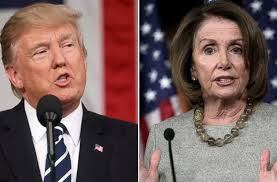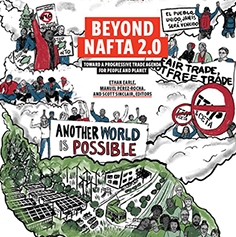In the general election, he used this same strategy to cast Hillary Clinton as the establishment candidate of the elite, and to win over disaffected former Democrats and nonvoters, particularly in the postindustrial “battleground” areas of the Upper Midwest where the notion of free trade still haunts working families.
Of course, Trump’s arguments about what drives bad trade agreements are very different from Sanders’s. Whereas Sanders tells a story that pits transnational corporations against ordinary people, Trump’s vision of trade is much more based on crude nationalism and xenophobia. In his telling, NAFTA and other such trade agreements allow other countries to take advantage of the US and its workers, with immigrants and other dark-skinned people stealing jobs from “real Americans,” both “at home” and abroad.
While it is indeed disturbing that this narrative found so much success in the ballot box, it’s worth remembering that the starting point was Trump’s correct observation that existing US trade policy hurts ordinary people. After all, even a broken clock is right from time to time.
6. Opposition to bad trade agreements brings a lot of people together.
This might seem obvious if you’ve been reading closely to this point, but it’s worth really spelling out. A lot of people from across the political spectrum are united in their opposition to current US trade policy.
On the left, Sanders’s campaign showed that this opposition brings together both Democratic voters and a wide range of progressive movements—from climate justice to free software to labor unions and beyond.
On the right, Trump’s victory showed much the same among ordinary Republican voters. And while some of these Trump voters are incorrigible racists and/or über-capitalists whom progressives cannot and should not try to win over, a lot of them are decent people who are sick of being screwed over and tired of a Democratic Party that has been selling them out for as long as they can remember. Winning these people over by convincing them of Sanders’s argument about free trade, as opposed to Trump’s, is what politics is about.
Breaking down silos to unite people against the corporate class will be absolutely necessary to build a new progressive majority in the 21st century.
7. Trade policy will again be a major wedge issue in the 2020 presidential election. This time, it could—and should—be Donald Trump’s Achilles heel.
As Mark Twain was reputed to have said, “History doesn’t repeat itself, but it often rhymes.” Trump’s NAFTA 2.0 will be firmly on the agenda during the 2020 campaign, as will the Transatlantic Trade and Investment Partnership, whose negotiation is once again under discussion (with Big Business once again calling the shots). More broadly, Trump will again be beating the same drum he did the last time around, selling the same old snake oil as medicine for what ails the people.
As Bernie Sanders has repeatedly pointed out, in 2016 Trump tapped into a real pain felt by working people that too many politicians had been ignoring. His arguments contained at least strands of the right diagnosis, but his policies have most definitely not contained the cure. Far from being an exception, his trade-policy decisions actually highlight his failure to provide that cure, as well as his gross hypocrisy as a politician.
A few minor improvements aside, NAFTA 2.0 has rehashed many of the same old bad policies while renewing itself just enough to ensure booming profit for the newest generation of robber barons in areas like digital trade and pharmaceuticals. Indeed, even Trump’s own International Trade Commission’s most recent projections indicate an impact for the broader public that is far inferior to what he has promised.
More recently, even Senate Republicans appear to be balking at Trump’s threats to impose tariffs on Mexican imports. Meanwhile, his ongoing trade war with China has isolated him from all but the hardest core of his base, and is polling badly in key 2020 battleground states like Pennsylvania. The snake oil is increasingly being exposed for exactly what it is.
All of this provides a massive tactical and strategic opportunity for progressive Democrats unafraid to criticize the bipartisan trade-policy consensus of the past generation. Quite simply, even if his diagnosis of what ailed US trade agreements was partially correct, Trump’s trade policies have not proven to be a cure for the ordinary people hurt by them, and he can be hit hard on this point. But, you ask, what actual alternatives can we offer beyond simple criticism?
8. Unlike Donald Trump, the left actually does have the right medicine.
Beyond just a rejection of the old trade policy and Trump’s response to that policy, what’s needed is a positive vision for a progressive trade policy that is good for working people and our shared planet, including in all of those places not named the United States of America. And I have good news for you: This already exists.
And even better, it’s not one single, magic cure, but rather a range of treatments developed by activists and academics over many years and just waiting to be given voice in the halls of US political power.
We have plans for a trade policy that will boost your wages, reduce your medical costs, protect your online privacy… you name it. And we have policy prescriptions that can be implemented immediately as a series of modest reforms, as well as more radical proposals that address the impending climate crisis by linking trade policy to an ambitious Green New Deal.
And more than at any time in recent memory, we have an ascendant left wing in Congress as well as at least two presidential candidates, Bernie Sanders and Elizabeth Warren, who are brave enough to buck the bipartisan consensus and offer voters a real alternative trade policy that will help them in their daily lives.
9. You have an historic opportunity to shape the future of US trade policy.
Let’s assume you’re convinced that this is an important issue. What, you might ask, can I do about any of this?
Actually, there’s quite a lot.
First off, you can support political candidates that dare to fight for a trade policy for people and planet, and not corporate profits or the 1 percent. There is a clear demand for this across the US political spectrum, and if we don’t take up this call, it’s clear that the Republicans will.
We, the people, have shown in recent times just how much we can do to stop trade agreements that threaten to damage almost everything we care about. In the end, it wasn’t Bernie or Trump who created such vociferous opposition to the TPP and TTIP. It was truly the American people who turned the 2016 elections into a trans-partisan referendum on the issue, allowing no serious candidate in either party to support these agreements.
From South America, to Africa, to Asia and Europe, movements of citizens have stood up time and again over the past decade to do just this. And with the political moment ripe for moving beyond opposition and toward the implementation of a positive alternative, there is no more important time than now for you to stand up to make your voice heard. There are chapters around the country doing just this right now.
And remember, a lot of big things start small. Even at your next family gathering, here are at least nine good arguments that might just bring your right-wing uncle and left-wing cousin together around something they can agree on.

